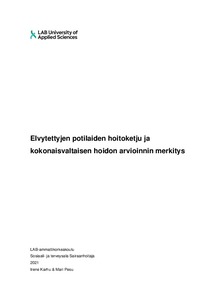Elvytettyjen potilaiden hoitoketju ja kokonaisvaltaisen hoidon arvioinnin merkitys
Karhu, Irene; Pesu, Mari (2021)
Avaa tiedosto
Lataukset:
Karhu, Irene
Pesu, Mari
2021
All rights reserved. This publication is copyrighted. You may download, display and print it for Your own personal use. Commercial use is prohibited.
Julkaisun pysyvä osoite on
https://urn.fi/URN:NBN:fi:amk-202104134689
https://urn.fi/URN:NBN:fi:amk-202104134689
Tiivistelmä
Tämän opinnäytetyön tarkoituksena oli selvittää elvytetyn potilaan hoitoketjun sekä kokonaisvaltaisen hoidon sisältöä. Tarkoituksena oli myös selvittää mitä hoidon arvioinnin merkitys tarkoittaa elvytetyn potilaan hoidossa.
Opinnäytetyössä käytettiin laadullista tutkimusmenetelmää. Haastateltavaksi valittiin Etelä-Karjalan keskussairaalassa työskenteleviä hoitajia, ja ryhmähaastattelut tehtiin teemahaastatteluperiaatteella. Opinnäytetyön aihe rajattiin elvytykseen sairaalan sisällä. Hoitajat valittiin tarkoituksenmukaisella otannalla. Haastattelu tapahtui ryhmähaastatteluna teemahaastattelu periaatteella. Haastatteluiden tarkoituksena oli selvittää Etelä-Karjalan keskussairaalan elvytysprotokollaa, kokonaisvaltaista hoitoa ja hoidon arvioinnin merkitystä.
Haastatteluiden tuloksina oli, että elvytettyjen potilaiden hoitoketju määräytyy sen mukaan mistä potilaan sydänpysähdys johtuu. Elvytettyjen potilaiden hoitoaika oli pitkä ja potilaille annettiin pitkä toipumisaika. Hoitajien mukaan potilaiden kokonaisvaltainen hoito oli tärkeässä osassa hoitoa, ja auttoi potilaita selviytymään elvytyksestä.
Opinnäytetyön tuloksia voidaan hyödyntää elvytysprotokollan kehittämiseen sekä potilaan hoidon arvioinnin kehittämiseen. Jatkossa voisi selvittää elvytetyn potilaan hoidon arvioinnin merkitystä ja hoitoprosessin etenemistä. The purpose of this thesis was to determine care chain of resuscitated patients and the content of comprehensive treatment. The goal was to find out what the meaning of holistic assessment treatment of resuscitation patient. We studied the subject from the point of view of the nurse and our research site we chose South Karelia central hospital. We limited research topic to resuscitation inside the hospital.
Our thesis was carried out using a qualitative research method. We interviewed nurses who worked at South Karelia central hospital. Nurses were selected with appropriate sampling. The purpose of the interviews was to find out the resuscitation protocol of South Karelia, the content of holistic care, and the importance of assessment of care. With interviews it turns out that care chain of revived patients' is individually determined according to what cardiac arrest is due to.
Treatment time of revived patients is, long and patients are given long recovery time. Overall care of patients is an important part of treatment, and it helps patients to survive resuscitation.
In the future, the results this thesis can be used to develop the resuscitation protocol and the development of assessment of care. Our new research ideas are the importance of a resuscitated patient’s assessment of care, the progress of the care process of resuscitated patients within the hospital, and the importance of a multiprofessional team in the care process of a resuscitated patient.
Opinnäytetyössä käytettiin laadullista tutkimusmenetelmää. Haastateltavaksi valittiin Etelä-Karjalan keskussairaalassa työskenteleviä hoitajia, ja ryhmähaastattelut tehtiin teemahaastatteluperiaatteella. Opinnäytetyön aihe rajattiin elvytykseen sairaalan sisällä. Hoitajat valittiin tarkoituksenmukaisella otannalla. Haastattelu tapahtui ryhmähaastatteluna teemahaastattelu periaatteella. Haastatteluiden tarkoituksena oli selvittää Etelä-Karjalan keskussairaalan elvytysprotokollaa, kokonaisvaltaista hoitoa ja hoidon arvioinnin merkitystä.
Haastatteluiden tuloksina oli, että elvytettyjen potilaiden hoitoketju määräytyy sen mukaan mistä potilaan sydänpysähdys johtuu. Elvytettyjen potilaiden hoitoaika oli pitkä ja potilaille annettiin pitkä toipumisaika. Hoitajien mukaan potilaiden kokonaisvaltainen hoito oli tärkeässä osassa hoitoa, ja auttoi potilaita selviytymään elvytyksestä.
Opinnäytetyön tuloksia voidaan hyödyntää elvytysprotokollan kehittämiseen sekä potilaan hoidon arvioinnin kehittämiseen. Jatkossa voisi selvittää elvytetyn potilaan hoidon arvioinnin merkitystä ja hoitoprosessin etenemistä.
Our thesis was carried out using a qualitative research method. We interviewed nurses who worked at South Karelia central hospital. Nurses were selected with appropriate sampling. The purpose of the interviews was to find out the resuscitation protocol of South Karelia, the content of holistic care, and the importance of assessment of care. With interviews it turns out that care chain of revived patients' is individually determined according to what cardiac arrest is due to.
Treatment time of revived patients is, long and patients are given long recovery time. Overall care of patients is an important part of treatment, and it helps patients to survive resuscitation.
In the future, the results this thesis can be used to develop the resuscitation protocol and the development of assessment of care. Our new research ideas are the importance of a resuscitated patient’s assessment of care, the progress of the care process of resuscitated patients within the hospital, and the importance of a multiprofessional team in the care process of a resuscitated patient.
